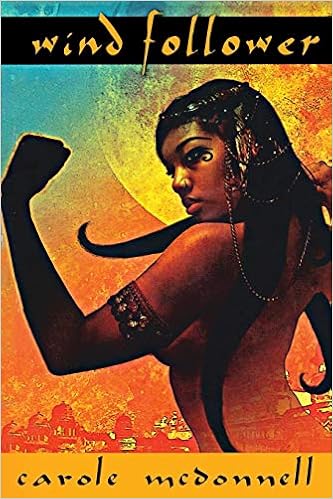 Reviewed by Molly Martin
Reviewed by Molly Martin
Wind Follower
by Carole McDonnell
Juno Books
Aug 2007, Paperback: 248 pages, ISBN-13: 978-0809557790
Carole McDonnell’s Wind Follower pulls The Reader right into the storyline from the opening scene when Loic talks about Kirka died. Kirka’s shaman father fetched Kirka before the elders at the Spirit Shrine, the sacrificial mound called Skull Place by the clan. Kirka was bound, the skin of his face had already been thrashed away, he was sobbing, begging and crying out for compassion. Focusing on Loic tyu Taer and Satha tya Monua a married couple from dissimilar tribes, Wind Follower represents a multiplicity of key tribes discovered in the account. Tribes are removed both by race and skin color.
Tribal groups consist of white skinned, light skinned and dark-skinned clans. Likewise, it is not just skin color which sets the numerous groups away from each other. Each tribe or clan is engrossed by its own group of fairly inflexible and ironclad, shared ideals, principals and ethics in addition to uniqueness, societal norms and even physical presence outside light or dark skin tones. One group indicates an Asian influence, while another gives the impression as more traditional African, while a third conveys the sense it is a balance of more than a single racial group. Additionally there is a mystical band created of a range of persons who interact with the native peoples in dissimilar manner; some helpfully, some evidently with no distinction as well as some not entirely noble.
McDonnell draws upon her extensive investigation into early African tribal practices in order to better set down a representation of the rituals, mores and qualities of the assorted parties in order to portray a representative clash of societies where social traditions and customs are absolute law. Wherein to unsettle a cultural more might well lead to demise of the individual, or even to conflict and outright battle among the groups.
Wind Follower is an explanation of earliest African people, their values and their customs, ethos and way of life in which the belief of forebears and spirit reverence are interwoven with a credible Christian message. McDonnell does not shy from matters relating to sacred belief, traditional group or of race. The locale of the account offered in the form of fantasy, serves to cause the anecdote to be even more out of the routine.
First person accounts can be complicated to produce with steadfastness. Not only does McDonnell utilize first person as her method for getting this narrative recorded, McDonnell competently interweaves the individual stories of the duo of main characters: Loic and Satha, and manages to use first person effectively twice. Loic and Satha each re-count their own part of the saga. That McDonnell is a clever author and master storyteller is unmistakable as she adroitly manages to give each character their own distinctive voice.
The various ethnicities, backgrounds and personalities as represented by McDonnell are plausible and convincing. Wind Follower’s setting is believable, and moving. The book offers varied cultures, with all their nuances of qualities and distinctiveness in a believable and gripping read. The work may bring the reader to a larger, perhaps deeper understanding regarding social sanctions, social mores and status of taboo without appearing preachy or causing the reader to feel overawed in the intricacies. Wind Follower is a good read, suitable for the young adult book list, public library, sociology class and mature readers.
Reviewed by: molly martin
www.angelfire.com/ok4/mollymartin
www.AuthorsDen.com/mjhollingshead
20+ years classroom teacher